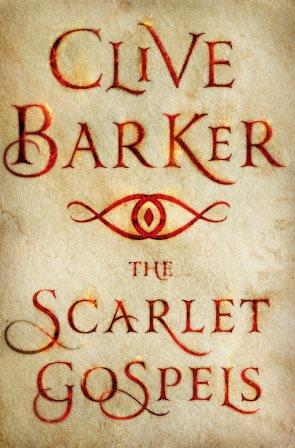 By CLIVE BARKER (St. Martin’s Press; 2015)
By CLIVE BARKER (St. Martin’s Press; 2015)
This is one case, I guess, in which disappointment was inevitable. The publication of Clive Barker’s THE SCARLET GOSPELS has been teased for well over a decade, and now that the novel is finally here two things are immediately apparent: 1). at 361 pages it’s far from the 1,000-plus page masterpiece I’ve heard portended, and 2). it’s not exactly the “epic summation” of Barker’s work in the horror field that was promised.
What it is is laudably ambitious. Indeed, had THE SCARLET GOSPELS been written by most any other writer it would be a tour de force. From Clive Barker, however, it’s pretty standard. Far from the “highly anticipated return to horror fiction” (which in fact already occurred in 2008’s MISTER B. GONE) claimed by the book jacket, it’s actually very much in line with the dark-hued fantasy epics that have come to define Barker’s written work.
THE SCARLET GOSPELS, as you’ve probably heard, marks the first—and apparently last—pairing of two of Barker’s most resonant creations: HELLRAISER’S “Hell Priest” Pinhead (who apparently really hates that name) and the tough-guy private dick Harry D’Amour from LORD OF ILLUSIONS (one of the only human characters in Barker’s fictional cannon who appears to interest him as much as the creatures he so lovingly details).
It certainly opens on a high note, with a group of ghosts, all of whom were killed after unwisely calling up Pinhead and his minions, getting dispatched in spectacularly gruesome fashion by the object of their veneration. From there we’re reacquainted with Mr. D’Amour, who’s currently residing in New Orleans. He’s contacted by Norma, a clairvoyant colleague, to break into the home of a recently deceased lawyer who’s gotten in touch with Norma from the other side. Said lawyer, it seems, doesn’t want his wife to learn about the debauched life he led, and asks Harry to clean out the place. Harry grants the dead man’s request, and while scouring his house discovers a Lament Configuration, or puzzle box—which, as you HELLRAISER fans well know, is what summons Pinhead.
This sets in motion an outrageous series of events. Harry and Pinhead go mano-a-mano in a suitably apocalyptic confrontation, followed by a literal trip into Hell—which as rendered in these pages is essentially another of the supernatural netherworlds that typify Barker’s fiction (be it Weaveworld, Quiddity, Imagica or Abarat). There Harry, Pinhead and their assorted companions undergo many action-packed escapades, and eventually meet up with Lucifer himself, whose form, status and eventual fate are all quite unexpected.
It’s all set down in Barker’s immaculately refined prose, which combined with his superbly described B-movie imagery and cinematic pacing make for an account that’s quite engrossing. The problem is that, again, this is nothing Barker hasn’t done before–and indeed even outdone in publications like THE BOOKS OF BLOOD, THE DAMNATION GAME and WEAVEWORLD. So while THE SCARLET GOSPELS is entertaining enough on its own terms, I say it’s not all it was cracked up to be.
